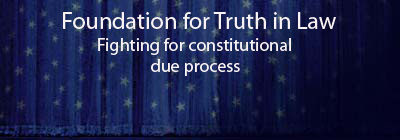|
|
 |
 |

|
Fraud upon the Court
Fraud Upon the Court is where the Judge (who is NOT the "Court") does NOT support or uphold the Judicial Machinery of the Court. The Court is an unbiased, but methodical "creature" which is governed by the Rule of Law... that is, the Rules of Civil Procedure, the Rules of Criminal Procedure and the Rules of Evidence, all which is overseen by Constitutional law. The Court can ONLY be effective, fair and "just" if it is allowed to function as the laws proscribe. The sad fact is that in MOST Courts across the country, from Federal Courts down to local District courts, have judges who are violating their oath of office and are NOT properly following these rules, (as most attorney's do NOT as well, and are usually grossly ignorant of the rules and both judges and attorneys are playing a revised legal game with their own created rules) and THIS is a Fraud upon the Court, immediately removing jurisdiction from that Court, and vitiates (makes ineffective - invalidates) every decision from that point on. Any judge who does such a thing is under mandatory, non-discretionary duty to recuse himself or herself from the case, and this rarely happens unless someone can force them to do so with the evidence of violations of procedure and threat of losing half their pensions for life which is what can take place. In any case, it is illegal, and EVERY case which has had fraud involved can be re-opened AT ANY TIME, because there is no statutes of limitations on fraud. This is a trillion dollar "justice industry" just waiting to be tapped.
"Fraud On The Court By An Officer Of The
Court"
And "Disqualification Of Judges, State and Federal"
1. Who is an "officer of the
court"?
2. What is
"fraud on the court"?
3. What effect does an act of
"fraud upon the court" have upon the court proceeding?
4. What causes the
"Disqualification of Judges?"
1. Who is an "officer of the court?"
A judge is an
officer of the court, as well as are all attorneys. A state judge is a state
judicial officer, paid by the State to act impartially and lawfully. A federal
judge is a federal judicial officer, paid by the federal government to act
impartially and lawfully. State and federal attorneys fall into the same
general category and must meet the same requirements. A judge is not the
court. People v. Zajic, 88 Ill.App.3d 477, 410 N.E.2d 626 (1980).
2. What is "fraud on the court"?
Whenever any
officer of the court commits fraud during a proceeding in the court, he/she is
engaged in "fraud upon the court". In Bulloch v. United States, 763 F.2d 1115,
1121 (10th Cir. 1985), the court stated "Fraud upon the court is fraud which
is directed to the judicial machinery itself and is not fraud between the
parties or fraudulent documents, false statements or perjury. ... It is where
the court or a member is corrupted or influenced or influence is attempted or
where the judge has not performed his judicial function --- thus where the
impartial functions of the court have been directly corrupted."
"Fraud upon the court" has
been defined by the 7th Circuit Court of Appeals to "embrace that species of
fraud which does, or attempts to, defile the court itself, or is a fraud
perpetrated by officers of the court so that the judicial machinery can not
perform in the usual manner its impartial task of adjudging cases that are
presented for adjudication." Kenner v. C.I.R., 387 F.3d 689 (1968); 7
Moore's Federal Practice, 2d ed., p. 512, ¶ 60.23. The 7th Circuit further
stated "a decision produced by fraud upon the court is not in essence a
decision at all, and never becomes final."
3. What effect does an act of "fraud upon the court" have upon
the court proceeding?
"Fraud upon
the court" makes void the orders and judgments of that court.
It is also clear and
well-settled Illinois law that any attempt to commit "fraud upon the court"
vitiates the entire proceeding. The People of the State of Illinois v. Fred E.
Sterling, 357 Ill. 354; 192 N.E. 229 (1934) ("The maxim that fraud vitiates
every transaction into which it enters applies to judgments as well as to
contracts and other transactions."); Allen F. Moore v. Stanley F.
Sievers, 336 Ill. 316; 168 N.E. 259 (1929) ("The maxim that fraud vitiates
every transaction into which it enters ..."); In re Village of Willowbrook, 37
Ill.App.2d 393 (1962) ("It is axiomatic that fraud vitiates
everything."); Dunham v. Dunham, 57 Ill.App. 475 (1894), affirmed 162
Ill. 589 (1896); Skelly Oil Co. v. Universal Oil Products Co., 338 Ill.App.
79, 86 N.E.2d 875, 883-4 (1949); Thomas Stasel v. The American Home Security
Corporation, 362 Ill. 350; 199 N.E. 798 (1935).
Under Illinois and Federal
law, when any officer of the court has committed "fraud upon the court", the
orders and judgment of that court are void, of no legal force or effect.
4. What causes the "Disqualification of Judges?"
Federal law
requires the automatic disqualification of a Federal judge under certain
circumstances.
In 1994,
the U.S. Supreme Court held that "Disqualification is required if an objective
observer would entertain reasonable questions about the judge's impartiality.
If a judge's attitude or state of mind leads a detached observer to conclude
that a fair and impartial hearing is unlikely, the judge must be
disqualified." [Emphasis added]. Liteky v. U.S., 114 S.Ct. 1147, 1162
(1994).
Courts have
repeatedly held that positive proof of the partiality of a judge is not a
requirement, only the appearance of partiality. Liljeberg v. Health Services
Acquisition Corp., 486 U.S. 847, 108 S.Ct. 2194 (1988) (what matters is not
the reality of bias or prejudice but its appearance); United States v.
Balistrieri, 779 F.2d 1191 (7th Cir. 1985) (Section 455(a) "is directed
against the appearance of partiality, whether or not the judge is actually
biased.") ("Section 455(a) of the Judicial Code, 28 U.S.C. §455(a), is not
intended to protect litigants from actual bias in their judge but rather to
promote public confidence in the impartiality of the judicial process.").
That Court also stated
that Section 455(a) "requires a judge to recuse himself in any proceeding in
which her impartiality might reasonably be questioned." Taylor v. O'Grady, 888
F.2d 1189 (7th Cir. 1989). In Pfizer Inc. v. Lord, 456 F.2d 532 (8th Cir.
1972), the Court stated that "It is important that the litigant not only
actually receive justice, but that he believes that he has received justice."
The Supreme Court has
ruled and has reaffirmed the principle that "justice must satisfy the
appearance of justice", Levine v. United States, 362 U.S. 610, 80 S.Ct. 1038
(1960), citing Offutt v. United States, 348 U.S. 11, 14, 75 S.Ct. 11, 13
(1954). A judge receiving a bribe from an interested party over which he is
presiding, does not give the appearance of justice.
"Recusal under Section 455
is self-executing; a party need not file affidavits in support of recusal and
the judge is obligated to recuse herself sua sponte under the stated
circumstances." Taylor v. O'Grady, 888 F.2d 1189 (7th Cir. 1989).
Further, the judge has a
legal duty to disqualify himself even if there is no motion asking for his
disqualification. The Seventh Circuit Court of Appeals further stated that "We
think that this language [455(a)] imposes a duty on the judge to act sua
sponte, even if no motion or affidavit is filed." Balistrieri, at 1202.
Judges do not have
discretion not to disqualify themselves. By law, they are bound to follow the
law. Should a judge not disqualify himself as required by law, then the judge
has given another example of his "appearance of partiality" which, possibly,
further disqualifies the judge. Should another judge not accept the
disqualification of the judge, then the second judge has evidenced an
"appearance of partiality" and has possibly disqualified himself/herself. None
of the orders issued by any judge who has been disqualified by law would
appear to be valid. It would appear that they are void as a matter of law, and
are of no legal force or effect.
Should a judge not
disqualify himself, then the judge is violation of the Due Process Clause of
the U.S. Constitution. United States v. Sciuto, 521 F.2d 842, 845 (7th Cir.
1996) ("The right to a tribunal free from bias or prejudice is based, not on
section 144, but on the Due Process Clause.").
Should a judge issue any
order after he has been disqualified by law, and if the party has been denied
of any of his / her property, then the judge may have been engaged in the
Federal Crime of "interference with interstate commerce". The judge has acted
in the judge's personal capacity and not in the judge's judicial capacity. It
has been said that this judge, acting in this manner, has no more lawful
authority than someone's next-door neighbor (provided that he is not a judge).
However some judges may not follow the law.
If you were a
non-represented litigant, and should the court not follow the law as to
non-represented litigants, then the judge has expressed an "appearance of
partiality" and, under the law, it would seem that he/she has disqualified
him/herself.
However,
since not all judges keep up to date in the law, and since not all judges
follow the law, it is possible that a judge may not know the ruling of the
U.S. Supreme Court and the other courts on this subject. Notice that it states
"disqualification is required" and that a judge "must be disqualified" under
certain circumstances.
The
Supreme Court has also held that if a judge wars against the Constitution, or
if he acts without jurisdiction, he has engaged in treason to the
Constitution. If a judge acts after he has been automatically disqualified by
law, then he is acting without jurisdiction, and that suggest that he is then
engaging in criminal acts of treason, and may be engaged in extortion and the
interference with interstate commerce.
Courts have repeatedly
ruled that judges have no immunity for their criminal acts. Since both treason
and the interference with interstate commerce are criminal acts, no judge has
immunity to engage in such acts.
|
|
|


 Why is the flag upside down?
Why is the flag upside down?